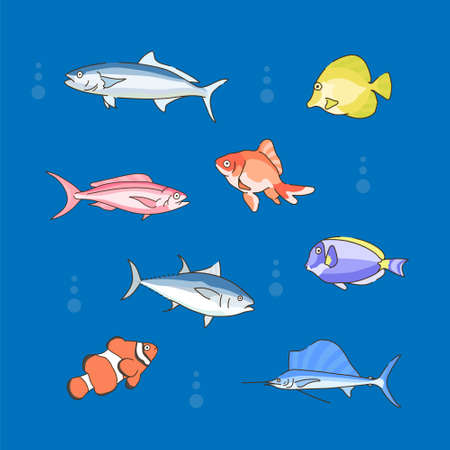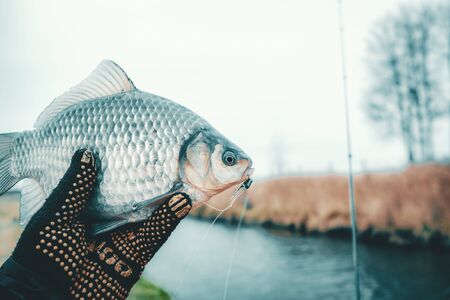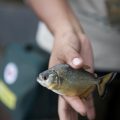Introduction to UK Mackerel Angling
Spinning for mackerel along the British coastline is more than just a pastime—it’s a cherished tradition woven into the fabric of seaside culture. As summer warms the waters from Cornwall to Northumberland, shoals of Atlantic mackerel sweep close to shore, drawing anglers of all backgrounds to piers, harbour walls, and rocky outcrops. The rhythmic cast-and-retrieve of spinning lures is as much a part of the British summer holiday as ice cream cones and striped deckchairs. Generations have gathered at dawn or dusk, hoping for the glint of blue-green fish in their buckets, while stories and tips are exchanged among friends and strangers alike. Mackerel angling not only offers an accessible way to connect with nature but also celebrates the bounty of local seas, marking the season with both excitement and responsibility. As we delve into the regulations, bag limits, and conservation measures that shape this beloved activity, it’s worth appreciating its deep roots in British leisure and coastal heritage.
Essential Regulations for Spinning
Before you cast a line into British coastal waters in pursuit of the lively mackerel, it’s vital to acquaint yourself with the UK’s legal framework for recreational sea fishing. The government has implemented specific regulations to ensure sustainable fish stocks and to promote responsible angling. While the rules are generally straightforward, they do vary slightly depending on where you plan to fish—England, Scotland, Wales, or Northern Ireland—so always double-check local requirements before heading out.
Licensing Requirements
For recreational sea anglers targeting mackerel from the shore or a private vessel, a licence is not typically required in most of the UK. However, if you intend to sell your catch or fish within certain protected areas, different rules may apply. Below is a summary table outlining the current licensing situation across regions:
| Region | Licence Required? | Notes |
|---|---|---|
| England & Wales | No* | *No licence needed for recreational sea fishing from shore or private boat. Exemptions apply for selling catch. |
| Scotland | No | No licence for spinning from shore or boat. Marine protected areas have additional rules. |
| Northern Ireland | No* | *No licence for sea angling; check local restrictions near conservation zones. |
Permitted Areas and Times
The UK boasts a variety of accessible coastal spots for mackerel spinning, but some areas are subject to seasonal closures or conservation restrictions. Marine Protected Areas (MPAs), nature reserves, and certain piers may have local bylaws prohibiting fishing at specific times of year—often during spawning periods. Additionally, while there are no blanket national closed seasons for mackerel, regional variations exist, particularly where conservation measures are in place to protect juvenile fish.
Summary Table: Area and Seasonal Restrictions
| Area Type | Access Status | Key Considerations |
|---|---|---|
| Public Beaches & Piers | Open (unless signposted) | Check local signage for any special restrictions. |
| Marine Protected Areas (MPA) | Restricted/Varies | Fishing may be limited or banned; consult MPA guidelines before visiting. |
| Harbours & Ports | Varies | Permissions often needed from harbour authorities. |
A Final Word on Compliance
The onus remains on every angler to know and follow the latest regulations before setting out. The Marine Management Organisation (MMO) and local fisheries officers regularly update guidance and patrol popular venues. Failing to comply with these rules can result in fines and confiscation of equipment—so it pays to stay informed and fish responsibly along our beautiful British coastline.

3. Bag Limits and Size Restrictions
When it comes to spinning for mackerel around the UK’s diverse coastline, understanding bag limits and size restrictions is essential for responsible and legal angling. Daily catch limits are set to protect mackerel stocks, ensuring healthy populations for both present and future anglers. These regulations can differ not only by region but also according to specific bylaws established by local authorities.
England
In England, while there is currently no national daily bag limit for recreational sea anglers targeting mackerel, many local councils and port authorities enforce their own restrictions, particularly during peak summer runs. Anglers are strongly encouraged to take only what they need for personal consumption, with some hotspots recommending a voluntary limit of 20 fish per person per day. The minimum landing size in England is generally set at 20cm, although this may be subject to adjustment in certain areas or through future policy changes.
Scotland
Scottish regulations reflect a strong conservation ethos. On many piers and harbours, especially in the west and north, bylaws recommend a maximum daily take—often mirroring the 20-fish guideline—though this is not always legally binding for recreational anglers. Some popular locations have community-enforced codes of conduct that encourage minimal impact on local stocks. As in England, the minimum recommended landing size for mackerel is 20cm.
Wales
Welsh waters feature a patchwork of regional bylaws, with several coastal councils actively managing their fisheries through public information campaigns and signage. While there is no statutory national bag limit, a 20-fish per person recommendation is common practice along busy stretches such as the Llŷn Peninsula and Pembrokeshire coast. The minimum size for landed mackerel typically aligns with the UK-wide guideline of 20cm.
Northern Ireland
Northern Ireland’s approach combines statutory regulation with local stewardship. In key angling hubs like Bangor and Portrush, advisory bag limits of 15–20 fish per day are commonplace and widely respected among the community. The legal minimum landing size here also stands at 20cm, reinforcing a consistent message across the UK regarding sustainable harvests.
Regional Bylaw Variations
It’s vital to check local notices or consult with tackle shops before setting out, as some areas may implement temporary measures during periods of high pressure on stocks or special events. Not only does this ensure compliance with the law—it also supports broader conservation aims shared by responsible anglers throughout Britain.
4. Best Practice for Conservation
Responsible mackerel spinning is about more than following the letter of the law; it’s about embracing a mindset that values sustainability and respect for the marine environment. Whether you’re casting from a rugged Cornish headland or a bustling pier in Brighton, adopting best practices ensures healthy fish stocks for future generations and protects the wider ecosystem.
Handle with Care: Reducing Stress and Injury
Minimising harm starts with how you handle your catch. Wet your hands before touching fish to preserve their protective slime, use barbless hooks to ease unhooking, and support the fish gently if you must lift it from the water. Avoid placing fish on rough or hot surfaces, as this can cause unnecessary injury or stress.
Returning Undersized Catch
The UK sets minimum landing sizes for mackerel (generally 20cm), but conservation-minded anglers often set personal standards even higher. If your catch is below legal size or if you simply don’t intend to keep it, return the fish promptly and carefully. This practice not only complies with regulations but also supports healthy recruitment into future stocks.
Environmentally Friendly Tackle Choices
Selecting sustainable tackle reduces your impact on both target species and the broader environment. Consider these options:
| Tackle Choice | Sustainable Advantage |
|---|---|
| Barbless Hooks | Easier release, less injury to fish |
| Biodegradable Line | Breaks down naturally, less plastic pollution |
| Lead-Free Weights | No toxic residues in waterways |
| Reusable Lures & Rigs | Less waste, longer-lasting gear |
Encouraging a Culture of Sustainable Angling
Leading by example—whether by picking up litter after a session or sharing knowledge with fellow anglers—helps foster a community that values conservation. Many local clubs and regional initiatives around the UK actively promote responsible angling through workshops, signage, and voluntary codes of conduct. By championing best practices on every outing, we contribute to both the health of our seas and the vibrancy of our angling heritage.
5. Respecting the Coastal Environment
Britain’s windswept coastlines are not just an angler’s playground, but delicate habitats teeming with life and history. As mackerel spinning continues to grow in popularity, it’s vital that we fishers become stewards of these cherished places. Responsible etiquette begins with a simple principle: leave no trace. Always collect your tackle packaging, bait wrappers, and discarded line—nothing should be left behind but footprints in the sand. Litter, especially fishing line and hooks, poses real threats to seabirds and marine mammals; carrying a small rubbish bag is a mark of both courtesy and conservation.
While casting from piers or rocky outcrops, be mindful of sensitive plant life clinging to the cliffs and tidal pools bustling with creatures at your feet. Avoid trampling vegetation or disturbing nesting birds—these are the quiet custodians of Britain’s maritime heritage. If you see wildlife in distress, alert local wildlife rescue groups rather than intervening directly.
Practising good angling manners also means respecting other coastline users. Share space amicably with fellow anglers, walkers, birdwatchers, and families enjoying the seaside. Keep noise levels down at dawn or dusk when local residents value tranquillity most. When rinsing gear, use sea water rather than public taps to conserve fresh water resources in rural communities.
By adhering to these principles—thoughtful waste management, habitat protection, and harmonious coexistence—we not only safeguard coastal ecosystems but also help preserve the freedom to enjoy spinning for mackerel along Britain’s wild and storied shores for generations to come.
6. Staying Up-to-Date
For any responsible UK angler, keeping pace with the latest regulations is just as important as choosing the right spinning gear for mackerel. The rules governing bag limits, conservation zones, and seasonal closures can change from year to year—or even month to month—depending on local fish stocks and environmental concerns. Before you set off for a session on the pier or rocky headland, it’s crucial to consult reliable resources to ensure your fishing trip stays within the law and supports sustainable practices.
Trusted Resources for Regulation Updates
The best starting point is always the official government websites. The Marine Management Organisation (MMO) provides up-to-date guidance on sea fisheries across England, including regional byelaws, minimum landing sizes, and catch limits. For Scotland, Marine Scotland offers specific advice tailored to Scottish waters. Welsh anglers can refer to Natural Resources Wales, while those in Northern Ireland should consult DAERA. These sites frequently update their advisories according to scientific surveys and stakeholder feedback.
Local Tackle Shops and Clubs
For more nuanced or area-specific information, popping into your local tackle shop or joining a regional angling club can be invaluable. Not only do these establishments keep their ear to the ground regarding rule changes or temporary restrictions, but they also foster a community of ethical anglers who are passionate about protecting local stocks. Many clubs will post updates on noticeboards or social media groups—worth checking before you plan your next outing.
Seasonal Alerts and Environmental Notices
It’s wise to keep an eye out for seasonal advisories issued by conservation organisations such as the Angling Trust or local wildlife trusts. These bodies regularly publish alerts about spawning periods, algal blooms, or marine protected areas where fishing may be restricted or prohibited altogether for conservation reasons. Subscribing to their newsletters or following them on social media ensures that vital information lands directly in your inbox or feed.
Ultimately, staying informed isn’t just about avoiding fines—it’s about doing your part as a steward of Britain’s remarkable marine environment. With a little research and community spirit, you’ll keep spinning for mackerel both legal and sustainable all season long.


